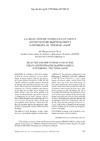Identificador persistente para citar o vincular este elemento:
https://accedacris.ulpgc.es/jspui/handle/10553/41566
| Campo DC | Valor | idioma |
|---|---|---|
| dc.contributor.author | Curbelo Tavío, María Elena | en_US |
| dc.date.accessioned | 2018-07-16T12:44:34Z | - |
| dc.date.available | 2018-07-16T12:44:34Z | - |
| dc.date.issued | 2017 | en_US |
| dc.identifier.issn | 0210-7694 | en_US |
| dc.identifier.other | Dialnet | - |
| dc.identifier.uri | https://accedacris.ulpgc.es/handle/10553/41566 | - |
| dc.description.abstract | B. Schönborn (1530-1585) publicó, en 1565, los Versus Sententiosi et eximii, un florilegio de autores clásicos, entre los que destaca, por su gran número de extractos, Ovidio. En este artículo estudiamos aquellos extractos del poeta de Sulmona que contienen el término amor y que fueron seleccionados por el humanista a modo de sentencias con el fin de establecer qué aspectos reconocibles en el Ovidio clásico destacó el filólogo alemán y qué otros nuevos perfiles se le otorga en el Renacimiento a partir de la selección y manipulación de sus textos. Además, este trabajo también demuestra que el prototipo del Proyecto excerpta, del que nos hemos servido para la recopilación de los extractos, obtiene datos fiables que permiten realizar investigaciones significativas y extrapolables sobre la influencia de los florilegios. | en_US |
| dc.description.abstract | The physician, mathematician and philologist B. Schönborn (1530-1585) published in 1565 the Versus Sententiosi et eximii, a florilegium of classical authors among whom Ovid stands out as one of the most cited sources. In this article attention has been focused on the humanist’s selection of those excerpts from the poet of Sulmona which contain the term amor, gathered as sentences in this florilegium. My aim is to establish which features recognizable in classical Ovid have been outlined by the German philologist and which new ones have been attributed to him in the Renaissance after the selection and manipulation of his texts. Furthermore, this article also shows that the prototype of Proyecto excerpta, used for the compilation of the excerpts, retrieves reliable data to conduct meaningful research on florilegia. | en_US |
| dc.language | spa | en_US |
| dc.relation.ispartof | Habis | en_US |
| dc.source | Habis [ISSN 0210-7694], n. 48, p. 317-334 | en_US |
| dc.subject | 5701 Lingüística aplicada | en_US |
| dc.subject.other | Schönborn | en_US |
| dc.subject.other | Florilegios | en_US |
| dc.subject.other | Ovidio | en_US |
| dc.subject.other | Amor | en_US |
| dc.subject.other | Humanidades digitales | en_US |
| dc.subject.other | Tradición clásica | en_US |
| dc.subject.other | Florilegia | en_US |
| dc.subject.other | Ovid | en_US |
| dc.subject.other | Digital humanities | en_US |
| dc.subject.other | Classical tradition | en_US |
| dc.title | La selección de Ovidio en los 'Versus Sententiosi' de Bartholomeus Schönborn: el término 'amor' | en_US |
| dc.title.alternative | Selected excerpts from Ovid in the Versvs Sententiosi by Bartholomeus Schönborn: the term amor | en_US |
| dc.type | info:eu-repo/semantics/article | en_US |
| dc.type | Article | en_US |
| dc.identifier.url | http://dialnet.unirioja.es/servlet/articulo?codigo=6132974 | - |
| dc.description.lastpage | 334 | - |
| dc.identifier.issue | 48 | - |
| dc.description.firstpage | 317 | - |
| dc.investigacion | Artes y Humanidades | en_US |
| dc.type2 | Artículo | en_US |
| dc.contributor.authordialnetid | 346055 | - |
| dc.identifier.dialnet | 6132974ARTREV | - |
| dc.utils.revision | Sí | en_US |
| dc.identifier.ulpgc | Sí | es |
| dc.description.sellofecyt | Sello FECYT | |
| dc.description.esci | ESCI | |
| dc.description.dialnetimpact | 0,0 | |
| dc.description.dialnetq | Q1 | |
| dc.description.dialnetd | D3 | |
| dc.description.erihplus | ERIH PLUS | |
| item.fulltext | Con texto completo | - |
| item.grantfulltext | open | - |
| crisitem.author.dept | GIR IATEXT: Filología Clásica "Juan de Iriarte" | - |
| crisitem.author.dept | IU de Análisis y Aplicaciones Textuales | - |
| crisitem.author.dept | Departamento de Filología Hispánica, Clásica y de Estudios Árabes y Orientales | - |
| crisitem.author.orcid | 0000-0002-6474-3212 | - |
| crisitem.author.parentorg | IU de Análisis y Aplicaciones Textuales | - |
| crisitem.author.fullName | Curbelo Tavío, María Elena | - |
| Colección: | Artículos | |
Visitas
48
actualizado el 10-ene-2026
Descargas
77
actualizado el 10-ene-2026
Google ScholarTM
Verifica
Comparte
Exporta metadatos
Los elementos en ULPGC accedaCRIS están protegidos por derechos de autor con todos los derechos reservados, a menos que se indique lo contrario.
